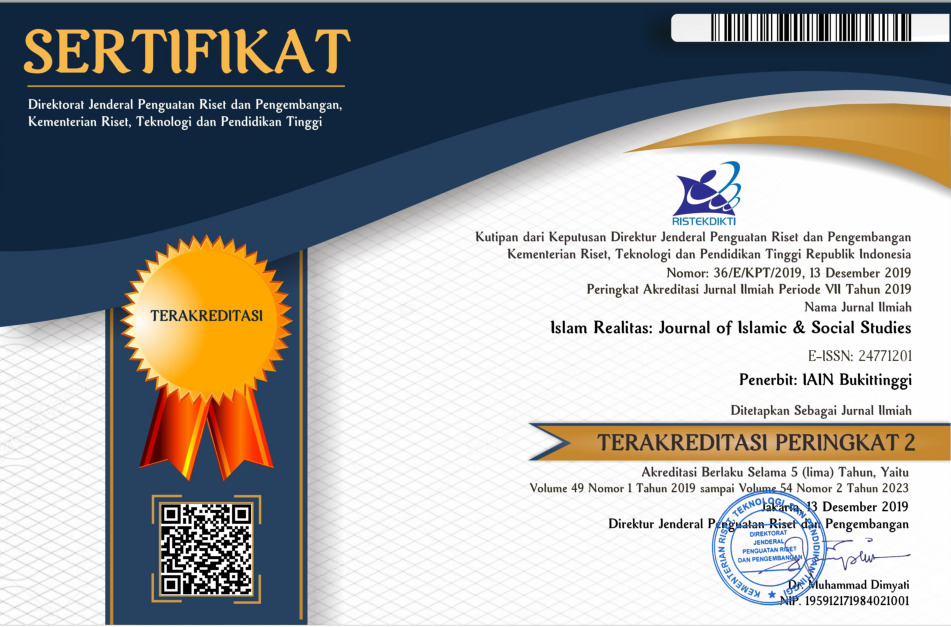PARADIGMA PERENCANAAN PEMBANGUNAN DAERAH DALAM PERSPEKTIF EKONOMI ISLAM
Downloads
This article aims to elaborate the paradigm of regional development planning in the perspective of Islamic economics. The need for new perspectives in formulating development planning is quite significant considering the weaknesses and failures of the conventional paradigm which has been the background. The worldview proposed through this paper integrates Islamic values (al-Quran and al-Sunnah) as meta-framework and archetypal models; development goals as contained in the 1945 Constitution and other regulations; local wisdom in each region.
Â
Artikel ini bertujuan mengelaborasi paradigma perencanaan pembangunan daerah dalam perspektif ekonomi Islam. Kebutuhan terhadap perspektif baru dalam merumuskan perencanaan pembangunan cukup penting mengingat kelemahan dan kegagalan paradigma konvensional yang selama ini melatarinya. Paradigma yang diusul melalui tulisan ini mengintegrasikan: nilai-nilai Islam (al-Quran dan al-Sunnah) sebagai metaframework dan archetypal model; tujuan pembangunan sebagaimana termuat dalam UUD 1945 dan peraturan lainnya; kearifan lokal yang terdapat di masing-masing daerah.
Â
A Prasetyantoko, dkk (ed.), Pembangunan Inklusif Prospek dan Tantangan di Indonesia, Jakarta : LP3ES, 2012
Abduh, Muhamad, dan Mohd Azmi Omar. “Islamic banking and economic growth: the Indonesian experience.†International Journal of Islamic and Middle Eastern Finance and Management 5, no. 1 (30 Maret 2012): 35–47. https://doi.org/10.1108/17538391211216811.
Arief, Sritua, & Adi Sasono, Indonesia Ketergantungan dan Keterbelakangan, edisi revisi, Jakarta : Mizan, 2013
Askari, Hossein, “Economic Development in Islam,†dalam Zamir Iqbal dan Abbas Mirakhor (ed), Economic Development and Islamic Finance, Woshington DC : The World Bank, 2013
Auda, Jasser, Maqashid al-Shariah as Philosophy of Islamic Law: a Systems Approach, London : IIIT, 2007
Bell, Daniel dan Irvin Kristol, (Ed.), Krisis Teori Ekonomi, terj. Jakarta : LP3ES, 1987
Biddle, Karen Golden & Karen D. Locke, Composing Qualitative Research, California : Sage Publication, 2007
Budiman, Arief, Teori Pembangunan Dunia Ketiga, Jakarta : Gramedia, 2000
Chapra, “Ibn Khaldun’s Theory of Development : Does it Help Explain the Low Performance of the Present-day Muslim World?,†The Journal of Socio-Economics, No. 37, 2008
Chapra, Islam and Economic Development, Pakistan : IIIT Islamabad, 1993
Chapra, M. Umer, The Future of Economics: an Islamic Perspective, terj. Jakarta : Shariah Economics and Banking Institute, 2001
Chapra, The Islamic Vision of Development in the Light of Maqasid al-Shari’ah, London : IIIT, 2008
Dariah, Atih Rohaeti, dkk., “Development Planning in Islamic Perspective : New Structure Based on Indonesia Experience,†International Proceedings of Economics Development and Research, Singapore: IACSIT Press. 2014
Eppler, Erhard, Melindungi Negara dari Ancaman Neoliberal, terj. Jakarta : Friedrich-Ebert-Stiftung, 2009
Fakih, Mansour, Jalan Lain Manifesto Intelektual Organik, Cet. Ke-2, Yogyakarta : Pustaka Pelajar, 2011
Fakih, Mansour, Runtuhnya Teori Pembangunan, Yogyakarta : Pustaka Pelajar, 2006
Ginting, Ramlan, dkk. Kodifikasi Peraturan Bank Indonesia Likuiditas Rupiah: Operasi Moneter, Operasi Moneter Syariah dan Sertifikat Bank Indonesia Syariah, Bank Indonesia : Pusat Riset dan Edukasi Bank Sentral, 2013
Gunawan, Jamil, dkk. (ed), Desentralisasi dan Demokrasi Lokal, Jakarta : LP3ES, 2004
Harvey, David, A Brief History of Neoliberalism, New York : Oxford University Press, 2005
Hasan, Zubair, “Economic Development in Islamic Perspective: Concept, Objetives and Some Issues,†Journal of Islamic Economics, Vol. 1, No. 6, 1995
Hasan, Zubair, “Sustainable Development from an Islamic Perspective: Meaning Implications and Policy Concerns,†Islamic Economics, Vol. 19, No. 1, 2006
Hatta, Mohammad, Ekonomi Berentjana, Jakarta : Gunung Agung, 1971
Ismail, Abd. Ghafar B., dan Muhammad Zilal Hamzah, “Fiscal Decentralization and Economic Growth Nexus :Evidence from Province-Level Cross-Section Data for Indonesia,†Review of Islamic Economics, Vol. 10, No. 2, 2006
Kuncoro, Mudrajad, “Desentralisasi Sekedar Alat,†pengantar buku Jamil Gunawan, dkk. (ed), Desentralisasi dan Demokrasi Lokal, Jakarta : LP3ES, 2004
Leksono, Sony, Penelitian Kualitatif Ilmu Ekonomi dari Metodologi ke Metode, Jakarta : Rajawali Press, 2013
Liddle, R. William. “The Politics of Ekonomi Pancasila: Some Reflections on a Recent Debate.†Bulletin of Indonesian Economic Studies 18, no. 1 (Maret 1982): 96–101. https://doi.org/10.1080/00074918212331334130.
Lorenzo Fioramonti. Problem Domestik Bruto: Sejarah dan Realitas di Balik Angka Pertumbuhan Ekonomi. terj. Jakarta: Margin Kiri, 2017.
McCawley, Peter. “The Economics of Ekonomi Pancasila.†Bulletin of Indonesian Economic Studies 18, no. 1 (1 Maret 1982): 102–9. https://doi.org/10.1080/00074918212331334140.
Mirakhor, Abbas, dan Hossein Askari, Islam and the Path to Human and Economic Development, New York : Palgrave Macmillan, 2010
Mohd. Yusof, Rosylin, dan Mejda Bahlous. “Islamic banking and economic growth in GCC & East Asia countries: A panel cointegration analysis.†Journal of Islamic Accounting and Business Research 4, no. 2 (23 September 2013): 151–72. https://doi.org/10.1108/JIABR-07-2012-0044.
Mubyarto, “Krisis Ilmu Ekonomi Indonesia,†A.B. Lapian, dkk.,, Sejarah dan Dialog Peradaban Persembahan 70 Tahun Prof. Dr. Taufik Abdullah, Jakarta : LIPI Press, 2005
Mubyarto, Sistem dan Moral Ekonomi Indonesia, Jakarta : LP3ES, 1988
Mubyarto, Teknokrat dan Ekonomi Pancasila, Yogyakarta : Adiya Media, 2004
N. Zaman, “Sustainable Islamic Development: Recognizing the Primacy of Trust, Iman and Institution,†International Journal of Economics, Management, and Accounting, Vol. 21, No. 1, 2013
Noor, Isran, Politik Ekonomi Daerah untuk Penguatan NKRI, Jakarta : Seven Strategic Studies, 2012
Oey, Mayling, dan Peter Gardiner, “Lepas Landas Ekonomi dan Kesenjangan Regional: Pembangunan di Luar Jawa,†Prisma Majalah Pemikiran Sosial Ekonomi, Nomor 3, Tahun 1990
Ormerod, Paul, The Death of Economics, London : Faber and Faber, 1994
Piketty, Thomas, Capital in the Twenty-First Century, translated by A.Goldhamer, Cambridge : Harvard University Press, 2014
Rahardjo, M. Dawam, Pembangunan Pascamodernis Esai-esai Ekonomi Politik, Yogyakarta : Insist Press, 2012
Rais, Mohammad Amien, Agenda-Mendesak Bangsa Selamatkan Indonesia!, Yogyakarta : PPSK, 2008
Rizky, Awalil & Nasyith Majidi, Neoliberalisme Mencengkram Indonesia, Jakarta : E. Publishing, 2008
Salleh, Muhammad Syukri, “Philosophical Foundations of Islamic Development : Khursid Ahmad’s Conceptions Revisited,†International of Education and Research, Vol. 1, No. 7, Juli 2013
Sardar, Ziauddin, Kembali ke Masa Depan; Syari’at sebagai Metodologi Pemecahan Masalah, terj., Jakarta : Serambi, 2005
Sasana, Hadi, “Analisis Dampak Desentralisasi Fiskal terhadap Pertumbuhan Ekonomi di Kabupaten/Kota Provinsi Jawa Tengah,†Dinamika Pembangunan, Vol. 3, No. 2, Desember 2006
Shaikh, Salman Ahmed. “Zakat Collectible in OIC Countries for Poverty Alleviation: A Primer on Empirical Estimation.†INTERNATIONAL JOURNAL OF ZAKAT 1, no. 1 (22 November 2016): 17–35.
Sjafrizal, Perencanaan Pembangunan Daerah dalam Era Otonomi, Jakarta : Raja Grafindo Persada, 2014
Trijono, Lambang, dkk (ed), Potret Retak Nusantara: Studi Kasus Konflik di Indonesia, Yogyakarta : Center for Security and Peace Studies (CSPS UGM), 2004
Wahid, Nusron, Keungan Inklusif Membongkar Hegemoni Keuangan, Jakarta : KPG, 2014
Wibowo, Puji, “Mencermati Dampak Desentralisasi Fiskal terhadap Pertumbuhan Ekonomi Daerah,†Jurnal Keuangan Publik, Vol. 5, No. 1, Oktober 2008
Zaman, Asad, “Crisis in Islamic Economics; Diagnosis and Prescription,†Presented in 8th International Islamic Economics Conference, 11 Januari 2010
Authors who publish with this journal agree to the following terms:
- Authors retain copyright and grant the journal right of first publication with the work simultaneously licensed under a Creative Commons Attribution License that allows others to share the work with an acknowledgment of the work's authorship and initial publication in this journal.
- Authors are able to enter into separate, additional contractual arrangements for the non-exclusive distribution of the journal's published version of the work (e.g., post it to an institutional repository or publish it in a book), with an acknowledgment of its initial publication in this journal.
- Authors are permitted and encouraged to post their work online (e.g., in institutional repositories or on their website) prior to and during the submission process, as it can lead to productive exchanges, as well as earlier and greater citation of published work (See The Effect of Open Access).









